Assignment
Create a website to serve as a shareable, shapeable online environment for your engagement with lecture topics and your speculations on worldbuilding. This quarter, you will compose at least three multimodal webpages in your Digital Archive through three guided activities tied to the lecture units. Think of the contents of each webpage as a webtext: a piece of writing created for online presentation and thus taking advantage of the platform’s capacities to enrich writing with images, audio, video, links, and choices in layout and organization. This quarter’s activities are designed for you to reflect on what you are learning in an exploratory way. As the year progresses, you will continue to develop your website, assembling your collection of materials and interpretive ideas and moving toward your own Research Project in the Spring quarter.
As an online project, your Digital Archive gives you a place for capturing your own thoughts with an awareness of who can view and hear them. Its audience, or “public,” this quarter is your seminar community. By sharing your work on these activities with your peers, you will develop habits of noticing, connecting, interpreting, and explaining to other members of the burgeoning Humanities Core community what you find interesting. Practicing responsible citation of your sources will be important for your developing ethos as a scholar. With the ability to present your reflections online using a range of media, you will contribute to the co-creation of knowledge and collective understanding of worldbuilding in Humanities Core.
Your work this quarter on your Digital Archive will be worth a total of 20% of your lecture grade. You will create your website using UCI Google Sites; if you wish to use another platform, please speak to your seminar instructor before starting this assignment. To allow your peers and instructors to see your Digital Archive you must “publish” it, and “publish” again each time you add to or edit your site. You will share the link on the Canvas site for your seminar and also submit URLs for your assignment submissions.
Learning Goals
- Engage critically with ideas learned in lecture by identifying and applying interpretive methods and concepts and drawing connections among course materials and topics
- Engage creatively with ideas presented in lecture and with course materials and topics through reinterpretation, rearrangement, or drawing connections to other cultural works or contexts
- Exhibit rhetorical awareness of purpose, audience, genre, and context in choices of style, multimedia, and textual and visual organization
- Produce accurate, ethically responsible communication with citational practices appropriate to scholarly digital media
- Demonstrate information literacy skills by locating, evaluating, and integrating primary sources from institutional digital archives and databases
- Develop digital literacy and transferable technical skills through the design of a basic website
- Reflect critically on the experience of research, writing, and multimodal communication
Required Reading
Before you begin building your project, read the following:
Alexander, Jonathan. “Worldbuilding: An Introduction.” Humanities Core Handbook: Worldbuilding 2023–2024, XanEdu, 2023, pp. 1–8.
Herrmann, Amalia. “Building and Presenting Your Digital Archive.” Humanities Core Handbook: Worldbuilding 2023–2024, XanEdu, 2023, pp. 30–38.
Recommended Tools
I. UCI Google Sites within UCI Google Workspace (also known as Google Apps), easily shared with UCI users.
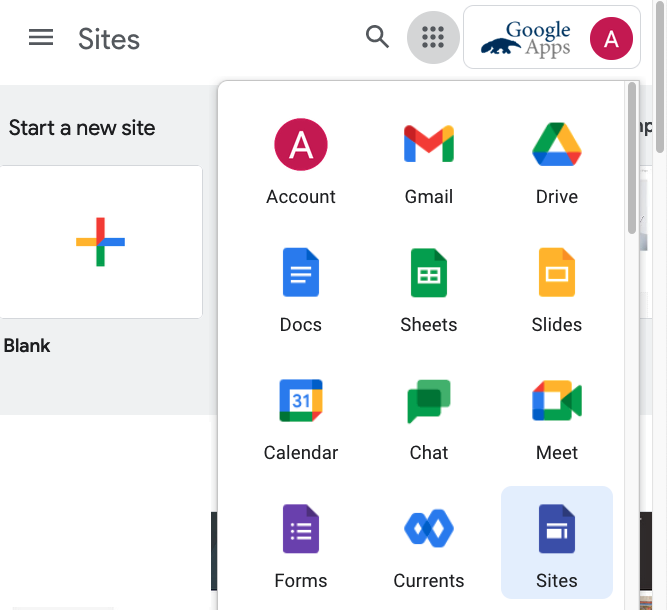
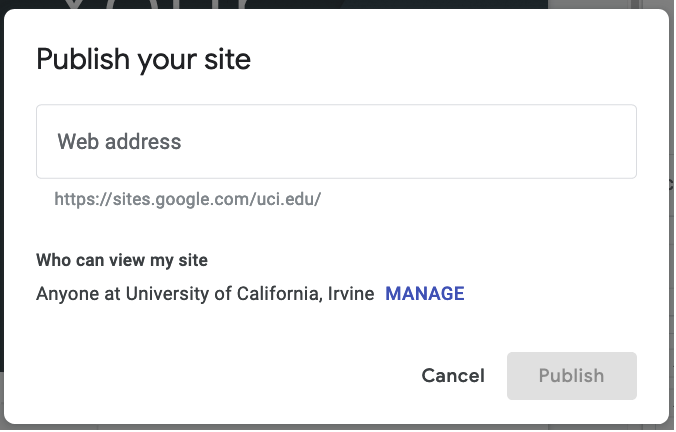
- For help, visit Google Sites Support or join the course help session in Week 1. Keep in mind that it can be difficult to create a Google Site on a phone.
- Your UCI Google Site will be stored in your UCI Google Drive, which provides organizable storage for media files and documents. You can collect materials in your UCI Google Drive for easy embedding in pages of your UCI Google Site. You are strongly encouraged to draft and save your work in a document in your preferred software (Google docs, etc.)
II. Whatever desktop or mobile apps you like using to capture, create, or edit media (photos, images, audio, or video). No special software will be required.
Examples of Excellent Student Work
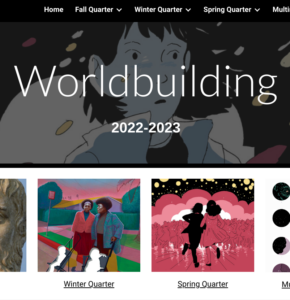
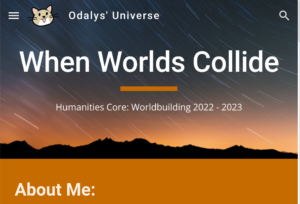
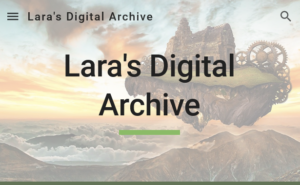
Fall 2023 Digital Archive Activities
Note: Your instructor may adjust these activity instructions for the particular emphases of your seminar.
Tip: Because it’s easy to organize materials in your Google Drive and to embed files from your Google Drive into pages of your Google Site, try collecting interesting images (plus source citations), quotations (plus source citations), or brainstormed thoughts in a Google Drive folder or a Google doc as you discover them, rather than waiting until the activity is due to gather some things to put on your page.
Digital Archive Activity 1: “Nobody–that’s my name”?
Reflect on the lectures about storytelling in the Odyssey 9: What was most memorable or intriguing about what you read or heard in Prof. Giannopoulou’s lectures about who tells the story, who claims the space as host or guest, and why?
On a new page of your Digital Archive site, explore the capacities of the Google Sites platform by writing text, reproducing quotations with appropriate citation, optionally presenting images with appropriate citation, and choosing layout options to explain to others what you have found interesting. As you explore the potential of your website for collecting materials and capturing thoughts, also use the opportunity to write at least one paragraph reflecting on starting this Digital Archive: How will you use the space of this website? Who would you say you are (right now) as a collector of materials related to worldbuilding, and who, as a collector of materials and assembler of ideas, do you plan to be? Building a website to contribute to your course learning might be a new experience for you; this first activity will help you think through some possibilities and plan ahead.
Length: A HumCore seminar community member should be able to read/view the contents of this page in about 5 minutes.
Before publishing your site, decide what name you will give your Digital Archive and put something on the homepage to start presenting yourself as the author, who may be pseudonymous. Once the site is published, copy the link, which should have the form https://sites.google.com/uci.edu/yoursitename. Submit this URL to the Canvas Assignment, and also share the link with the class on Canvas.
Digital Archive Activity 2: Where is Worldbuilding Possible?
Engage with and reflect on Prof. Shemek’s lectures on Boccaccio’s Decameron (introduced by her chapter in the Humanities Core Handbook): What was most memorable or intriguing about what you read or heard about the relationship between the real world and the spaces of or in storytelling? And what have you, in these first weeks, noticed in experiencing the spaces of UCI, physical or virtual? Is this university really a world apart, a pastoral setting, or does it function largely as a liminal space?
To illustrate your collection of lecture concepts, quotations, and your own thoughts on this webpage, include some images of UCI spaces you have encountered: photographs you have taken or images you have made. Where and how does this university provide spaces for retreating, reflecting, critiquing, and building worlds with others?
Length: A HumCore seminar community member should be able to read/view the contents of this page in about 5 minutes.
Before submitting the URL for this assignment, be sure to “publish” the changes to your site, then copy the link, which should have the form https://sites.google.com/uci.edu/yoursitename/pagename.
Digital Archive Activity 3: Making Connections
“Make People Touch and Taste and KNOW. Make People FEEL! FEEL! FEEL!” exhorts Octavia Butler in one of her many notebooks (archived at the Huntington Library.) As you near the end of the quarter, what does Octavia Butler’s Parable of the Sower help you notice about the function of speculative narratives in our culture(s) today, stories that imagine an alternate version of reality or project an alternative vision of a potential future? In what media or genres do you consume (or create) speculative narratives, and what is their appeal? Do you interpret these speculative narratives as pessimistic, optimistic, fatalistic, hopeful, or something else? What elements of our world do these stories make you feel or know, and how do you think visions of a dystopian or utopian future can influence worldbuilding in the present?
Use the multimodal potential of this webpage to share specific examples: music videos or playlists, movie clips, book cover images, etc. Explain to your peers why you think this cultural work offers a speculative narrative and how it might connect to what you learned from any or all of the lectures this quarter.
Length: A HumCore seminar community member should be able to read/view/listen to the contents of this page in about 5-7 minutes.
To conclude your Digital Archive for this quarter, look over the layout of pages and organization of your site. Return to your homepage and consider how you would like to present yourself as author and your site as an archive. How you choose to organize what you have collected may change over time as you draw connections that might not have been apparent at first glance.
